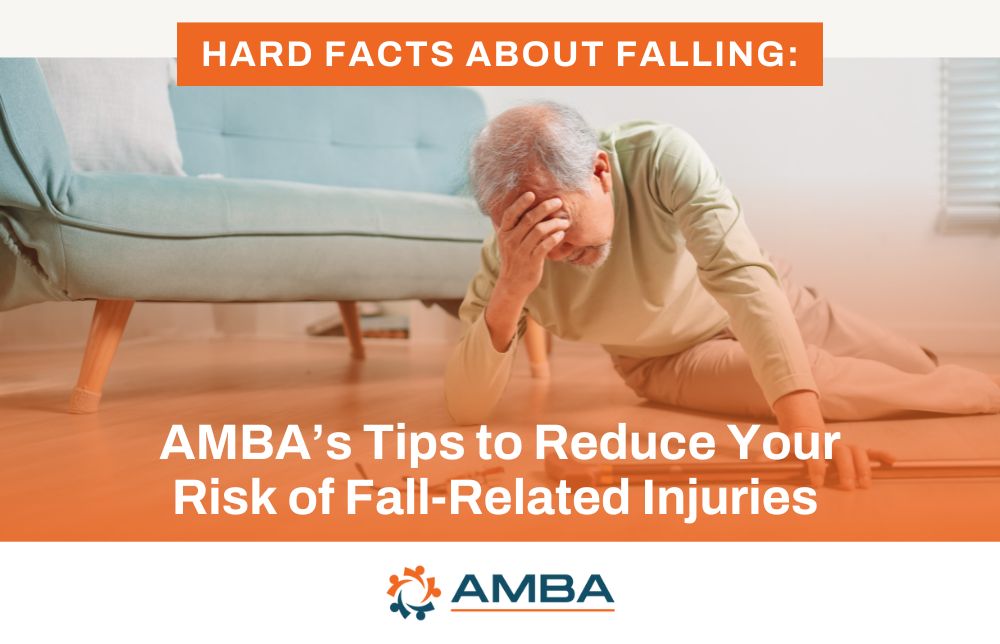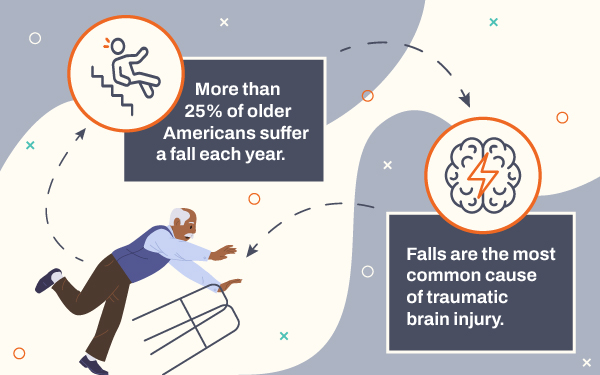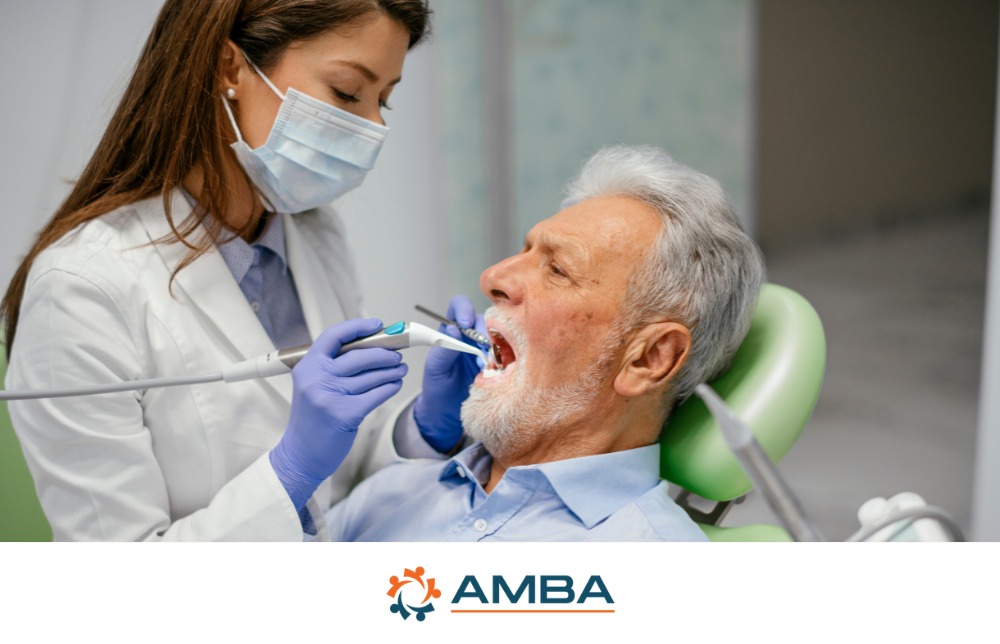
Hard Facts About Falling
August 1, 2024
How to reduce your risk of fall-related injuries and why an emergency medical transportation plan is essential
Among people over 65 years of age, falls are the primary cause of severe injuries and accidental death. About 3,000,000 older Americans are treated for fall injuries annually in emergency departments.
Most falls are due to a combination of risk factors, which may be personal or environmental-related. The more risk factors at any given time, the greater the chances of falling.
But if you reduce the number of risk factors, you can prevent a fall and avoid injury. Follow AMBA’s tips to help you stay safe and reduce your risk of falling.

Did You Know?
More than 25% of older Americans suffer a fall each year. Falls are the most common cause of traumatic brain injury.
Sensory Deficits
It’s common for vision, hearing, and sense of balance to become increasingly compromised as people age. These limitations can lead to issues like tripping on unseen hazards or being unaware of audio warnings, such as the sound of a nearby pet. Likewise, the ability to maintain balance and stability (and to regain it quickly once one stumbles) tends to reduce with age.
It’s important to create a safe environment in your home. Improving your home to mitigate or prevent sensory-related risks can help keep you safe:
- Install more lighting throughout the house, including each room, hall, and stairway.
- Turn off the television as you leave a room to reduce background noise.
- Remove clutter and obstacles on or close to the floor, such as cords and cables.
- Replace low chairs that are difficult to sit in or rise from.
- Install grab bars and handrails throughout the home.
- Place nonslip matting in the bath or shower.
Health Conditions
Many diseases and conditions typically associated with aging are directly tied to the risk of falling.
People with diabetes, heart disease, neurological conditions, and other chronic diseases are at a higher risk for falls. If you have health issues, starting and maintaining a doctor-recommended exercise routine is essential. Tai Chi can be an excellent option because it emphasizes lower body strength, stability, and balance—all critical for reducing the risk of falls.
Physical Factors
As people age, the wear and tear of decades accumulate. Degeneration, inflammation, swelling, and instability in joints, bones, muscles, ligaments, tendons, or nerves can all affect the ability to balance. Disorders like arthritis that can cause pain in the hips, knees, feet, ankles, back, neck, arms, and feet can reduce mobility, limit activity, and contribute to falls.
Conditioning and exercise are important first steps for people who struggle with walking discomfort. If the issue worsens, ask a doctor for recommendations for pain management or if surgery is an option.
Medications
There is evidence that falls become a greater danger when more than three prescription drugs are taken regularly. Pharmaceuticals most likely to increase fall risks include psychoactive medications, antihistamines, muscle relaxants, and blood pressure medications. You can review with your healthcare professional whether they recommend stopping or reducing your medications to help prevent falls.
Still, accidents that require emergency medical attention are a risk that can happen to anyone, anywhere, at any time. A ground ambulance or air transport could cost thousands, and Medicare may not cover this. Protect yourself from the high cost of emergency medical transportation with the Medical Air Services Association (MASA) plan from AMBA and your association. Services are paid in full, with no deductibles, co-pays, or dollar limits. Whether home or traveling, MASA covers your ambulance or airlift, regardless of age or medical condition. Learn more at www.AMBAmedtransport.com or call AMBA at 877-290-3170 M-F 8am-6pm CT.
https://www.ncoa.org/article/what-medications-increase-the-risk-of-falling-among-older-adults
https://www.cdc.gov/steadi/pdf/STEADI-Brochure-CheckForSafety-508.pdf
RECENT POSTS

An Ambulance Trip Is Stressful: With MASA, the Cost Doesn’t Have to Be
People who require an emergency ambulance trip frequently ask the same question upon receiving the bill: “Why was the
Read More

AMBA’s Essential Insights in Dental Health: Understanding Cavities
Have you ever experienced pain or noticed persistent sensitivity in your teeth? You might have a cavity. Cavities are common,
Read More

Smart Holiday Season Safety Tips for Travelers
Whether to get together with loved ones or to get away from it all, people love to travel during the holiday season. In fact,
Read More

Play the Long Game: 5 Important Reasons to Purchase Long-Term Care Insurance
When it comes to your health, it’s essential to plan for the unexpected. While this is important at any age, it's
Read More

